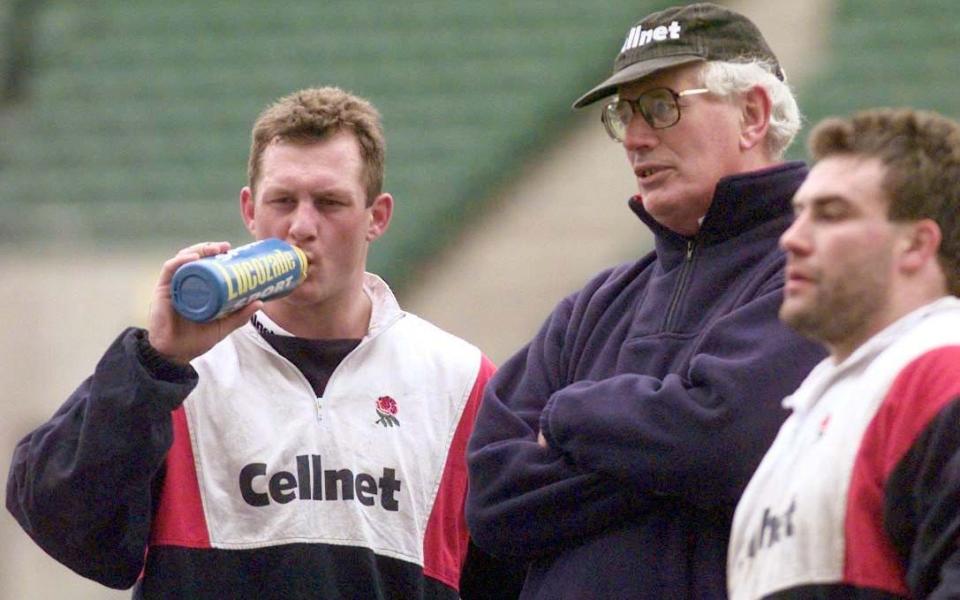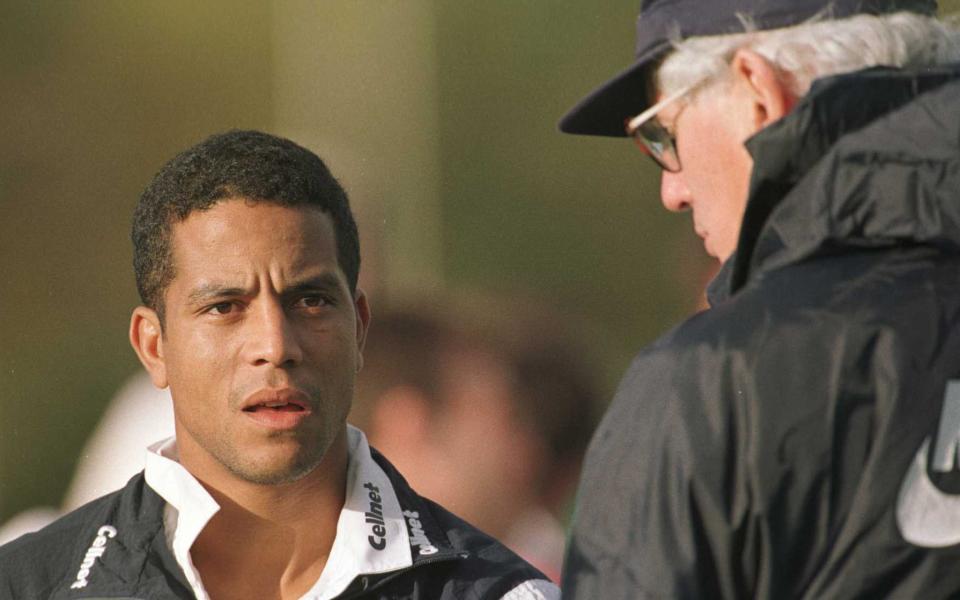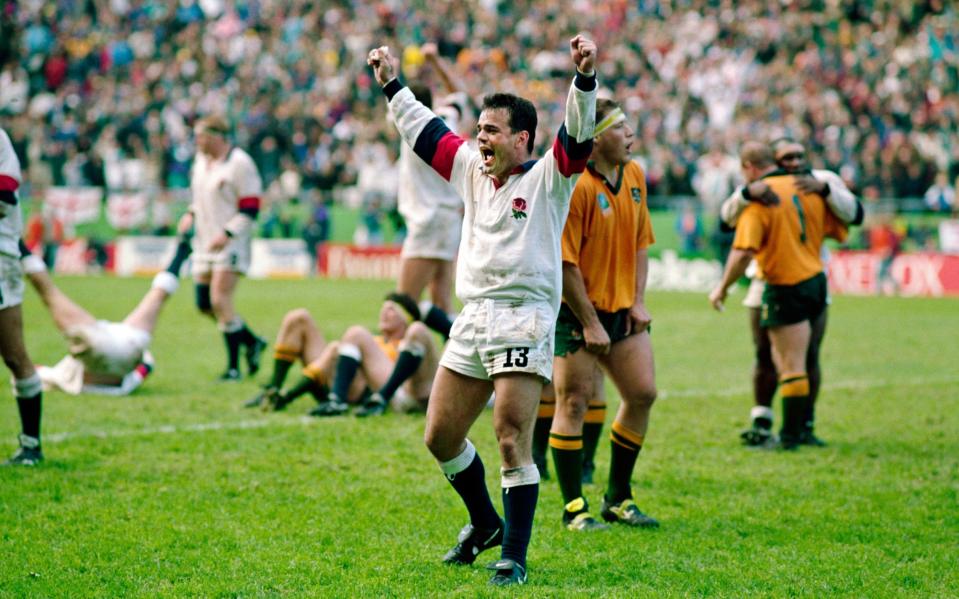‘Spiky but with a glint in his eye’: Will Carling and Andy Robinson pay tribute to Jack Rowell

When Andy Robinson was captain of Bath in the early 1990s, a role he split with teaching at the nearby King Edward’s School, each week he would discuss the upcoming team selection with Jack Rowell in a phone call which would last around three hours. Rowell would ask Robinson who he believed should play and then, as Robinson tells Telegraph Sport, “he would chastise me for the players I was selecting”.
On the discussions would go, with Robinson tasked by Rowell to explain his reasons for picking each player, until Rowell informed Robinson: “If that’s what you believe, we will go with that team.” The logic behind it was that by getting Robinson to go into bat for the players he wanted to select, explaining their strengths to Rowell, when the heat was turned up on the field Robinson would know why those players had been selected in the first place. “I think it was a great way of working,” Robinson adds.
Rowell, the greatest coach in Bath’s history winning eight John Player/Pilkington Cups and five league titles, died on Monday at the age of 87. Two weeks before he passed away John Hall, the former captain who succeeded Robinson and is now club president, arranged for a group of former players to go and see their coach. Robinson, Stuart Barnes, David Trick, John Horton and John Palmer were all present. Robinson, now the club’s head academy coach, was reminded of something by Rowell when discussing the recent Premiership final defeat by Northampton Saints. “‘Bath Rugby don’t lose finals.’ As he looked at me he said: ‘How can Bath lose in a final?’ So he still had his wit, as you would expect.”
Physically imposing at 6ft 7in, it was through that sharp tongue and readiness to crack a joke that Rowell seemed to win over so many players, as Robinson explains.

“He would cut you in half in a team meeting with the way he would speak to you, but in an individual meeting he would make you feel the best in the world. That was the beauty of him, you never knew what to expect. What he wanted to be able to do was to have a group of players who could challenge each other, because he saw that as the best way for us to get the best out of ourselves.”
From when he took over at Bath in 1978, Rowell was a great innovator, recognising the value of outside knowledge and the European game long before a European Cup existed. Pierre Villepreux, of Toulouse, was invited over to coach the side. Rowell, “a student of New Zealand rugby” as Robinson puts it, would implement ideas based on discussions with those in New Zealand. Frequently playing matches in Wales toughened Bath up and gave them belief they could beat any side anywhere. Dave Robson and Tom Hudson were trusted lieutenants, with Brian Ashton later joining Bath’s staff.
Dynasties require constant tweaks and updates, something Rowell was a master of at Bath with his personnel changing ever so slightly with each passing year; bringing in Robinson for Roger Spurrell, the arrival of Richard Hill and Barnes at half-back, the development in the pack of Martin Haag, Victor Ubogu and more. Robinson believes Bath’s Heineken Cup win in 1998, years after Rowell had left, was a fitting tribute to a coach who “saw the European competition occurring before it actually did”.
When Rowell did leave Bath in 1994, after completing a league-and-cup double, it was to replace Geoff Cooke as England head coach. Rowell finished with 21 wins in his 29 Tests, the second-best record in England’s history after Eddie Jones, and reached the semi-final of the 1995 Rugby World Cup after knocking out defending champions Australia in the quarters.

The expectation when Rowell took charge was that he would simply transplant Bath’s successful model and expansive style of play and go from there. But according to Will Carling, the former England captain under Rowell, the reality was a little different.
“He was genuinely unique. He created something very special at Bath,” Carling tells Telegraph Sport. “What impressed me was that when he came into England he had the confidence and ability to not just try and replicate that [success]. He didn’t just bring in a load of Bath players, he created something different.”
Carling warmed to Rowell’s dry sense of humour while experiencing that same ability of Rowell’s to reduce you to rubble which Robinson noted at Bath. England tactically were also more restrained.
“He didn’t advocate boring rugby, but he understood that club rugby is very different from Test rugby,” Carling notes. “He stuck with Rob [Andrew, at fly-half instead of Barnes] and he understood that in Test rugby you have to be slightly more pragmatic – but he wanted us to utilise everything that we had.”
When England were rocked by New Zealand in that 1995 semi-final, blown away to trail at one point 35-3, Carling and Rowell sat in the changing room afterwards trying to piece together what had happened following Jonah Lomu’s devastating performance.
“He just said he was proud that we fought back, that we came back at them. He said that means a lot,” adds Carling, with the final score 45-29. “The first 20 minutes were just horrific. But it was that bit that he was proud of. And in a way so was I.”
A highly successful businessman in the food industry, it was Rowell’s passion for the game and improving players, as Carling notes, which seemed to keep him immersed in the sport.
“He could be spiky, which is not a surprise, he was a successful person. All of that was taken on board because there was a little bit of a glint in the eye,” adds Carling. “You had the idea that in a sense he didn’t need to [be involved], he was a successful man. But he did it because he loved it, and that was the bit which always came through to me. He didn’t need the profile, any of that. He loved being around it and involved. I enjoyed his company and him because of that.”
A man ahead of his time, Bath have been trying to emulate Rowell’s legacy now for decades. In all likelihood, he will forever be their greatest coach.

 Yahoo Sport
Yahoo Sport 






































